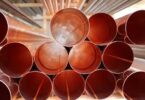LONDON (BBC News): The UK economy picked up in the first three months of the year after manufacturers’ stockpiling ahead of Brexit helped to boost growth. Growth was 0.5% in the quarter, up from 0.2% in the previous three months, the Office for National Statistics said.
The manufacturing sector grew at its fastest rate since 1988 in the period.
The ONS said this was driven by manufacturers rushing to deliver orders before the original Brexit deadline of 29 March.
Pharmaceuticals was one of the sectors most affected, expanding 9.4% between January and March.
Previous business surveys had shown manufacturers stockpiling goods for Brexit in case the UK left the EU without a transition deal, which they feared could lead to delays at UK borders.
However, the UK’s deadline to exit the EU has since been extended until the end of October after Prime Minister Theresa May asked the EU for more time to negotiate a deal. Is the increase in growth a sign the economy is stabilising?
Chancellor Philip Hammond said the figures showed the economy remained “robust”. “The economy has grown for nine consecutive years, debt is falling, employment is at a record high and wages are rising at their fastest pace in over a decade,” he said.
But analysts have warned the impact of Brexit could mean the pick-up in growth is short-lived. Tej Parikh, senior economist at business lobby group the Institute of Directors, said it could well be just “a flash in the pan”.
“Some businesses brought activity forward early this year in preparation for leaving the EU, so higher stocks and earlier orders have artificially bumped up the growth numbers. “In the second quarter, many firms will be keen to run down their Brexit caches, which will drag on economic growth,” he said.
But Ruth Gregory, senior UK Economist at Capital Economics, said the figures offered some “encouraging signs that underlying growth gained some pace”.
She said household consumption growth was “solid” and pointed out that business investment grew “for the first time in four quarters”.






